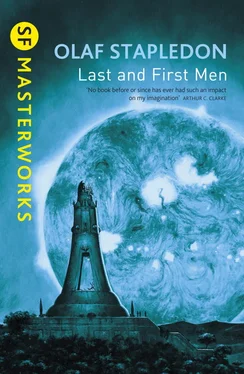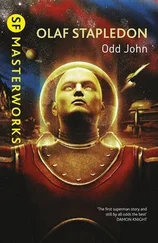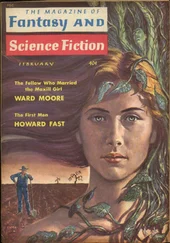Olaf Stapledon - Last and First Men
Здесь есть возможность читать онлайн «Olaf Stapledon - Last and First Men» весь текст электронной книги совершенно бесплатно (целиком полную версию без сокращений). В некоторых случаях можно слушать аудио, скачать через торрент в формате fb2 и присутствует краткое содержание. Город: London, Год выпуска: 1999, ISBN: 1999, Издательство: Orion Publishing Group, Жанр: Фантастика и фэнтези, на английском языке. Описание произведения, (предисловие) а так же отзывы посетителей доступны на портале библиотеки ЛибКат.
- Название:Last and First Men
- Автор:
- Издательство:Orion Publishing Group
- Жанр:
- Год:1999
- Город:London
- ISBN:978-1-857-98806-2
- Рейтинг книги:3 / 5. Голосов: 1
-
Избранное:Добавить в избранное
- Отзывы:
-
Ваша оценка:
- 60
- 1
- 2
- 3
- 4
- 5
Last and First Men: краткое содержание, описание и аннотация
Предлагаем к чтению аннотацию, описание, краткое содержание или предисловие (зависит от того, что написал сам автор книги «Last and First Men»). Если вы не нашли необходимую информацию о книге — напишите в комментариях, мы постараемся отыскать её.
is full of pioneering speculations about evolution, terraforming, genetic engineering and many other subjects.
Last and First Men — читать онлайн бесплатно полную книгу (весь текст) целиком
Ниже представлен текст книги, разбитый по страницам. Система сохранения места последней прочитанной страницы, позволяет с удобством читать онлайн бесплатно книгу «Last and First Men», без необходимости каждый раз заново искать на чём Вы остановились. Поставьте закладку, и сможете в любой момент перейти на страницу, на которой закончили чтение.
Интервал:
Закладка:
All these subvital units, save a few types that were too highly special ized, were capable of independent life as air-borne bacteria or viruses. And whenever they lost touch with the radiation of the whole system, they continued to live their own simple lives until they were once more controlled. All were free-floating units, but normally they were under the influence of the cloudlet’s system of electromagnetic fields, and were directed hither and thither for their special functions. And under this influence some of them might be held rigidly in position in relation to one another. Such was the case of the organs of sight. In early stages of evolution, some of the units had specialized for carrying minute globules of water. Later, much larger droplets were carried, millions of units holding between them a still microscopic globule of life’s most precious fluid. Ultimately this function was turned to good account in vision. Aqueous lenses as large as the eye of an ox, were supported by a scaffolding of units; while, at focal length from the lens, a rigid retina of units was held in position. Thus the Martian could produce eyes of every variety whenever he wanted them, and telescopes and microscopes too. This production and manipulation of visual organs was of course largely subconscious, like the focussing mechanism in man. But latterly the Martians had greatly increased their conscious control of physiological processes; and it was this achievement which facilitated their remarkable optical triumphs.
One other physiological function we must note before considering the Martian psychology. The fully evolved, but as yet uncivilized, Martian had long ago ceased to depend for his chemicals on wind-borne volcanic dust. Instead, he rested at night on the ground, like a knee-high mist on terrestrial meadows, and projected specialized tubular groups of units into the soil, like rootlets. Part of the day also had to be occupied in this manner. Somewhat later this process was supplemented by devouring the declining plant-life of the planet. But the final civilized Martians had greatly improved their methods of exploiting the ground and the sunlight, both by mechanical means and by artificial specialization of their own organs. Even so, however, as their activities increased, these vegetable functions became an ever more serious problem for them. They practised agriculture; but only a very small area of the arid planet could be induced to bear. It was terrestrial water and terrestrial vegetation that finally determined them to make the great voyage.
3. THE MARTIAN MIND
The Martian mind was of a very different type from the terrestrial, — different, yet at bottom identical. In so strange a body, the mind was inevitably equipped with alien cravings, and alien manners of apprehending its environment. And with so different a history, it was confused by prejudices very unlike those of man. Yet it was none the less mind, concerned in the last resort with the maintenance and advancement of life, and the exercise of vital capacities. Fundamentally the Martian was like all other living beings, in that he delighted in the free working of his body and his mind. Yet superficially, he was as unlike man in mind as in body.
The most distinctive feature of the Martian, compared with man, was that his individuality was both far more liable to disruption, and at the same time immeasurably more capable of direct participation in the minds of other individuals. The human mind in its solid body maintained its unity and its dominance over its members in all normal circumstances. Only in disease was man liable to mental or physical dissociation. On the other hand, he was incapable of direct contact with other individuals, and the emergence of a “supermind” in a group of individuals was quite impossible. The Martian cloudlet, however, though he fell to pieces physically, and also mentally, far more readily than a man, might also at any moment wake up to be the intelligent mind of his race, might begin to perceive with the sense-organs of all other individuals, and experience thoughts and desires which were, so to speak, the resultant of all individual thoughts and desires upon some matter of general interest. But unfortunately, as I shall tell, the common mind of the Martians never woke into any order of mentality higher than that of the individual.
These differences between the Martian and the human psyche entailed characteristic advantages and disadvantages. The Martian, immune from man’s inveterate selfishness and spiritual isolation from his fellows, lacked the mental coherence, the concentrated attention and farreaching analysis and synthesis, and again the vivid self-consciousness and relentless selfcriticism, which even the First Men, at their best, had attained in some degree, and which in the Second Men were still more developed. The Martians, moreover, were hampered by being almost identical in character. They possessed perfect harmony; but only through being almost wholly in temperamental unison. They were all hobbled by their sameness to one another. They were without that rich diversity of personal character, which enabled the human spirit to cover so wide a field of mentality. This infinite variety of human nature entailed, indeed, endless wasteful and cruel personal conflicts in the first, and even to some extent in the second, species of man; but also it enabled every individual of developed sympathy to enrich his spirit by intercourse with individuals whose temperament, thought and ideals differed from his own. And while the Martians were little troubled by internecine strife and the passion of hate, they were also almost wholly devoid of the passion of love. The Martian individual could admire, and be utterly faithful to, the object of his loyalty; but his admiration was given, not to concrete and uniquely charactered persons of the same order as himself, but at best to the vaguely conceived “spirit of the race.” Individuals like himself he regarded merely as instruments or organs of the “supermind.”
This would not have been amiss, had the mind of the race, into which he so frequently awoke under the influence of the general radiation, been indeed a mind of higher rank than his own. But it was not. It was but a pooling of the percipience and thought and will of the cloudlets. Thus it was that the superb loyalty of the Martians was squandered upon something which was not greater than themselves in mental calibre, but only in mere bulk.
The Martian cloudlet, like the human animal, had a complex instinctive nature. By night and day, respectively, he was impelled to perform the vegetative functions of absorbing chemicals from the ground and energy from the sunlight. Air and water he also craved, though he dealt with them, of course, in his own manner. He had also his own characteristic instinctive impulses to move his “body,” both for locomotion and manipulation. Martian civilization provided an outlet for these cravings, both in the practice of agriculture and in intricate and wonderfully beautiful cloud-dances and gymnastics. For these perfectly supple beings rejoiced in executing aerial evolutions, flinging out wild rhythmical streamers, intertwining with one another in spirals, concentrating into opaque spheres, cubes, cones, and all sorts of fantastical volumes. Many of these movements and shapes had intense emotional significance for them in relation to the operations of their life, and were executed with a religious fervour and solemnity.
The Martian had also his impulses of fear and pugnacity. In the remote past these had often been directed against hostile members of his own species; but since the race had become unified, they found exercise only upon other types of life and upon inanimate nature. Instinctive gregariousness was, of course, extremely developed in the Martian at the expense of instinctive selfassertion. Sexuality the Martian had not; there were no partners in reproduction. But his impulse to merge physically and mentally with other individuals, and wake up as the supermind, had in it much that was characteristic of sex in man. Parental impulses, of a kind, he knew; but they were scarcely worthy of the name. He cared only to eject excessive living matter from his system, and to keep en rapport with the new individual thus formed, as he would with any other individual. He knew no more of the human devotion to children as budding personalities than of the subtle intercourse of male and female temperaments. By the time of the first invasion, however, reproduction had been greatly restricted; for the planet was fully populated, and each individual cloudlet was potentially immortal. Among the Martians there was no “natural death,” no spontaneous death through mere senility. Normally the cloudlet’s members kept themselves in repair indefinitely by the reproduction of their constituent units. Diseases, indeed, were often fatal. And chief among them was a plague, corresponding to terrestrial cancer, in which the subvital units lost their sensitivity to radiation, so that they proceeded to live as primitive organisms and reproduced without restraint. As they also became parasitic on the unaffected units, the cloudlet inevitably died.
Читать дальшеИнтервал:
Закладка:
Похожие книги на «Last and First Men»
Представляем Вашему вниманию похожие книги на «Last and First Men» списком для выбора. Мы отобрали схожую по названию и смыслу литературу в надежде предоставить читателям больше вариантов отыскать новые, интересные, ещё непрочитанные произведения.
Обсуждение, отзывы о книге «Last and First Men» и просто собственные мнения читателей. Оставьте ваши комментарии, напишите, что Вы думаете о произведении, его смысле или главных героях. Укажите что конкретно понравилось, а что нет, и почему Вы так считаете.











